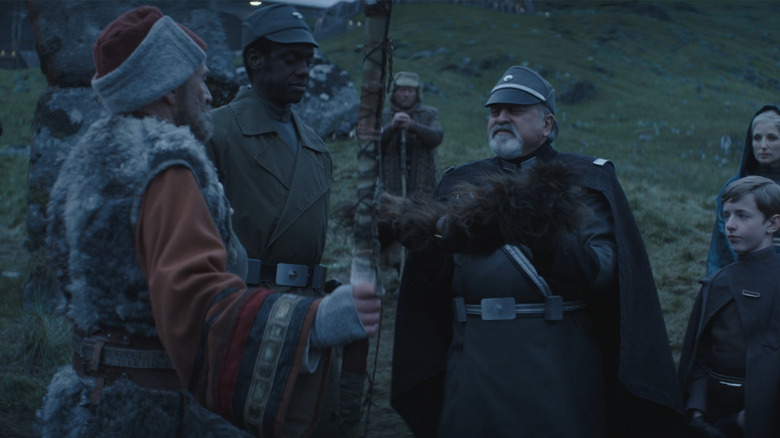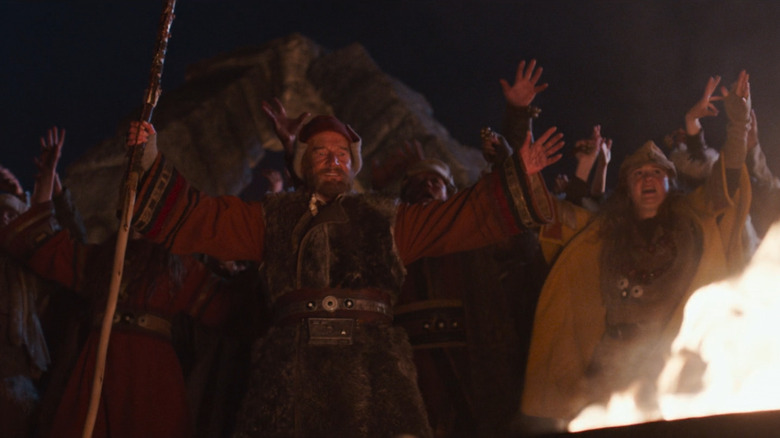One Of The Empire's Most Diabolical Acts In Andor Is Pretending To Respect The Culture Of Others
Spoilers ahead for the sixth episode of "Andor."
"Andor" pays off weeks of set-up in stunning fashion with a climactic, action-packed episode at the midpoint of the show's first season. After getting to know the crew stationed at Aldhani, Cassian and this team of rebels execute the long-awaited mission to steal from the Empire, and it's just as hectic as we expected. But the visually stunning chaos that ensues is only a portion of what the episode entitled "The Eye" brings to the table thematically. The dark reality the characters of "Andor" find themselves in is often a reflection of our own history. More explicit than ever, the world of "Star Wars" is being used to touch upon mature themes that have real weight to them, and the sixth episode is no different.
The Empire has already been caught basking in its hubris, but the latest episode further exemplifies the vileness of its diabolical nature. Despite colonialism characterizing the Empire since the original trilogy, its psychological nature has not been explored as deeply until now. "Andor" often gives the audience a close look at the intricacies of the galaxy-wide oppression machine through the lens of those who work it. And now we learn exactly how they feel about those they conquer and ravage in their never-ending conquest for total domination.
'They're a simple people'
During the first few minutes of "The Eye," Commandant Beehaz (Stanley Townsend) and Colonel Petiger (Richard Katz) have a discussion about the state of their relationship with the people of Aldhani. The Empire has colonized the planet for its resources and has no intention of maintaining a healthy relationship with the locals if it deters them from plundering the sacred lands to build a new base. However, they keep up the appearance of peace to avoid trouble. The Imperial officers participate in their customs and trade pelts, but do not think for a second that the Dhanis are anything more than an obstacle.
For the second time this season, they make remarks about the smell. They see these native people as animals, ones far below their status as pompous cogs for the Empire. As the imperial officer mentions, he believes the Dhanis to be a simple people, incapable of holding multiple ideas at once and easily manipulated. The Empire and its sheep believe they are the shepherds of the colonized planet, yet that could not be further from the truth.
Defiance is in the air
Juxtaposed with the rebel heist is the festive celebration by the Aldhani people. The Dhanis laugh and dance with the arrival of The Eye, a celestial event. The cultural moment is a beautiful sight to behold, both in the sky and on the ground. The Dhanis celebrate despite their circumstance, and in an act of defiance, burn the pelt given to them by the Empire. Unlike what Jayhold suggests, there is no sign that the Dhanis are oblivious to the situation they find themselves in, nor are they a simple people.
As the rebellion fights the Empire head-on, we see what they are fighting for. The moment of joyous activity is something that may no longer be possible if the Empire continues to have its way. The repulsive perspective the Empire has on the Dhanis and other colonized peoples won't be going away anytime soon. However, what "Andor" accomplishes in spades is giving nuance to previously untapped areas of the canon, giving more thematic weight to the overall presentation of the Empire and its oppressive machine.
New episodes of "Andor" release Wednesdays on Disney+.


